The Secret to Harnessing Viral Marketing with Sterling Beck
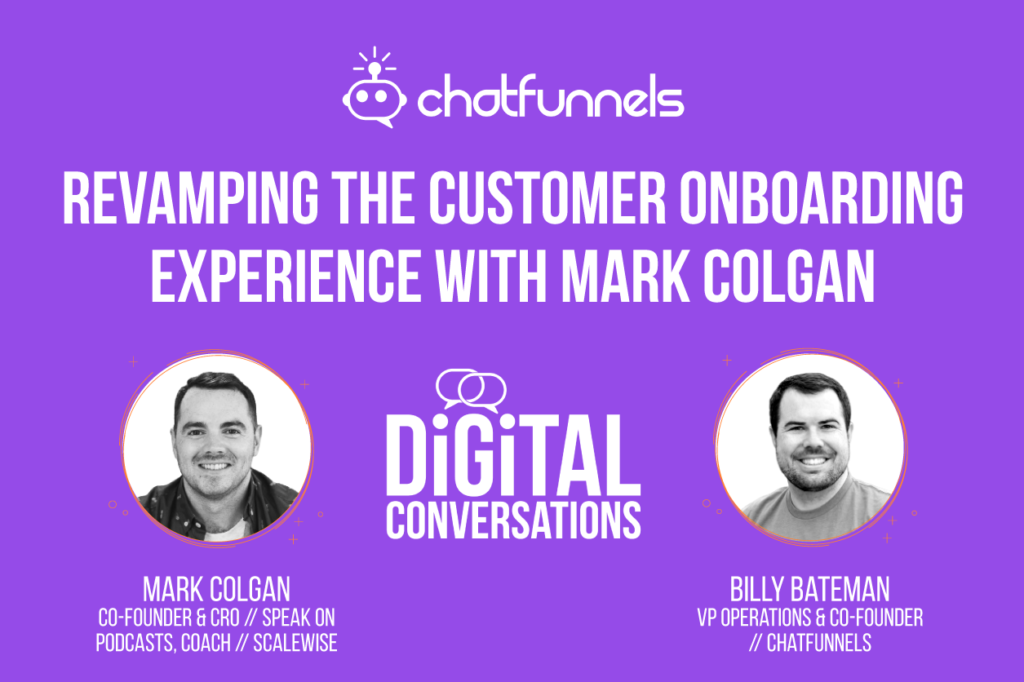
Overview: On this episode of digital conversations with Billy Bateman our guest is Sterling Beck head of marketing at ListReports. They discuss the future of digital marketing and how to use viral growth and word of mouth to generate leads.
Guest: Sterling Beck–Sterling has a proven 10+ year history of managing teams that drive B2B SaaS companies inbound efforts in the finance, human resources, sales and marketing industries. His enterprise and account based approach to marketing efforts has produced verifiable results that directly contributed to multiple rounds of VC investment that consistently affirm his strategies work.
Sterling has owned 9-figure annual budgets and managed campaign roll-outs with large inbound sales orgs on mediums as diverse as Pandora, in-flight videos, billboards, and broad digital media buys. Whether working to produce 10,000 MQLs monthly for a B2B SaaS product or negotiating with Google to bring fiber to his community, Sterling’s passion remains the same: building and executing growth plans for the things he loves.
Reference:
Billy: Alright everybody, welcome to digital conversations. This week, my guest is Sterling Beck, head of marketing at ListReports. Sterling, thanks for joining us. How you doing today?
Sterling: I’m doing great. Thanks for having me, Billy.
Billy: Yeah, excited to have you on today. Today we’re going to talk a lot about the future of digital marketing. But before we dive into that, just want to have you introduce yourself a little bit. Tell us about your background and a little bit about ListReports.
Sterling: I’ve been a digital marketer since back in the day when digital marketing was more or less being invented as a thing. I was very much a kind of a geek as a 12-year old and I got into computers, and as soon as people started paying money for banner ads, paid advertising, all that jazz. I was all over it and it’s something that really quick with me.
So I’ve been working in the b2c marketing space for the better part of the last decade. And currently, I’m the Head of Marketing at a company called ListReport, which services huge space within the real estate industry. We have several hundred thousand real estate agents using our tool to track different transactions, to create free marketing templates that allow them to do all kinds of wonderful things.
If you’re a real estate agent, your strong suit might not be in drawing up flyers for an open house, or creating a website, or creating wonderful, good looking delightful content. We take care of all of that for you. And we do it absolutely free. It’s hugely popular, like I said. We have somewhere around 200,000 real estate agents currently using our tools.
Billy: Amazing. That’s good stuff, man. Just before we dive in to anything else though, what’s your main demand Gen tool you’re using at ListReports?
Sterling: This is going to be a fun one. This one is going to surprise you, I think. We are not spending a penny on digital marketing right now.
Billy: Okay.
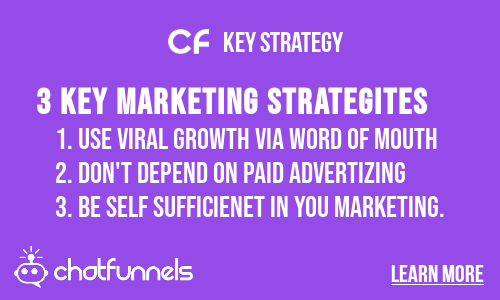
Sterling: We have found ways of being able to grow our network virally, and being able to utilize things like customer referrals and incentivizing certain behaviors to the extent that we haven’t had to shovel huge amounts of money towards Google AdWords or Facebook in order to achieve the kind of growth we’ve been able to pull up.
Billy: Wow, amazing. We’ll have to dive into that a little more in a minute. But before we get into the middle of it, I want to just ask you, okay, if I’m going to figure out who Sterling Beck is and do a little social snooping, what is something that I wouldn’t figure out, what connect your LinkedIn, your Facebook or your Instagram? What’s something interesting about Sterling most people don’t know?
Sterling: Oh boy, I think you’ll find a lot of interesting things and new thing. I’ve traveled to several dozens of countries in the last couple of years. I love traveling. I’m a big gamer, and that’s the one you might not find on my social. But I was one of the top five ranked video game players for a video game called Warcraft three way back in the day when I should have been going to college.
And probably the one that you definitely will not find on social because I’ve been very careful to SEO way or history about this. But I am a horrible dancer, just ridiculously bad dancer to the extent that I took lessons with my wife prior to our wedding and was essentially told by an instructor that I probably shouldn’t come back that I was that bad. I’ve tried sticking with it. But honestly, when you get to the point where someone that you are paying to teach you to dance is telling you that there’s no hope, it is a little disheartening to keep the data.
Billy: Yeah, man. I’m not a dancer either. No judgment here. I took a social dance class in college, and I think I just passed because I showed up every day. That’s the only reason I passed. The teacher was like, “Well, Billy, you showed up every time.”
Sterling: Showing up is nice 90% of the work in life, right?
Billy: I totally agree actually in showing up and just putting in the work. Awesome, man. Well, a world of Warcraft. Number three in the world. That’s impressive.
Sterling: Warcraft three…
Billy: Okay, cool, man. Well, let’s dive into it and let’s talk some marketing. You were talking about viral marketing and how you guys have been able to develop this customer base without spending any money on paid per click or display ads. Let’s dive into that and how do we get into this kind of viral growth and harnesses marketers? Tell us a little bit about what we can do?
Sterling: I think that one of the challenges of being a digital marketer today where you have so many different tools and so many different options, in terms of what direction you can go, is that when you’re a hammer, everything looks like a nail to you. We come into companies with a background where maybe had good success with AdWords than our past company, or maybe we use LinkedIn and we found just a fantastic group.
We created a certain viral video that is just really, really connected with our audience. All of that is irrelevant with the new products that you are pushing. When you come in to a different company, a lot of your past successes with tools, understanding how to use the tool, that’s a wonderful thing to have an understanding. But being able to do the exact same thing every single time with different products is just an exercise in futility.
It’s something that companies like Google love, because they kind of thrive on marketers who are lazy. And honestly, we are a lazy bunch in many ways. We love set it and forget it kind of campaign. And that’s one of the scary things, I think when you talk about what does the future of digital marketing look like? One vision of that future could be one in which the Googles and the Facebooks of the world have found a way to essentially ensure that they are capturing the vast majority of all revenue.
You’re essentially having to pay them 90, 95% of your sales and marketing costs just so that they can give you that continued growth because they have these closed ecosystems and he’s become so addicted to the easy results. And that’s kind of something that I’ve been giving a lot of thought, like, how do you break that cycle? How do you run a company where you don’t necessarily have to… Don’t get me wrong. It’s wonderful to use those tools. But what if you were able to find other tools to have in your toolkit that allow you to achieve this thing and growth without necessarily having to spend six figures every month on paying the Google tax and Facebook tax?
Billy: Yeah.
Sterling: At ListReports support, to answer your question, what we found is that agents are very much a networking, people who work in real estate, especially real estate agents, they have to network with everyone. That’s how you get your name out there.
Billy: Yep.
Sterling: The idea of us buying an ad on Google to hopefully connect with another real estate agent, there’s nothing wrong with that strategy. But it kind of ignores one of the facts of the real estate industry, which is, every agent probably works in brokerage with dozens of other agents, and probably knows hundreds of other agents within their area.
Finding a way to capture that word of mouth to make it very easy for agents to refer not only other agents, but also to gift or rather share different tools and different options within just the different templates and different features that we have of a product ended up being just this massive growth component for our company and the one which we’re able to honestly said, hey, we already have thousands and thousands of agents signing up every week. How can we take advantage of this word of mouth of this beautiful awareness that people are starting to get? Because now, one agent and other agent flyer and it looks 10 times better than theirs. And they are like, hey, how did you make this? And that agent says, well, I got this free template from ListReports. Great. So, they come to our website.
The question was, okay, so we have a lot of word of mouth, like the flyers and templates, how do we get those agents to actually directly refer other people though our platform? As we optimize our products very, very humbly, using things like chat and just nice little overlay bubbles that come up when you perform certain functions within the product that basically says, hey, it looks like you’re trying to do this advanced feature, we will unlock this advanced feature for you free of cost if you’re willing to refer another person on to our platform. We saw a huge success with that. It’s been incredible. It’s made me feel guilty.
And honestly, I feel pretty bad for all the boatloads of cash that I’ve dumped into Facebook and Google in previous year, without necessarily taking a step back and saying, hey, could we achieve a lot of what we’re trying to achieve using different tools and using different paths that don’t necessarily get the data and spending so much money?
Billy: Yeah, that’s awesome. Yeah, just having them refer people to unlock more features within the product, I’m guessing it’s really easy for them to just put an email address in and you’re going to automate the rest of it for them?
Sterling: Exactly. And depending on what your product is, and what you want that viral loop to look like. It’s not as if you can’t have people within your company helping to facilitate those kinds of connections. For example, if you see a very good referral company, have maybe someone on your CF team or your sales team call. Rather than just being an email referral saying, hey, I think you should give them a platform, maybe you also send a phone message saying, hey, we’re inviting you to get on the platform. We’d really like to see you to get some success out of joining and being able to work with them.
Billy: That’s great. That’s definitely a different approach than most of us who are making content, who’ve got our PPC ads or Facebook ads, LinkedIn ads, depending on who we’re selling to. You’ve got this viral growth going, where do you see the future of digital marketing going then?
Sterling: I think there’s probably a couple of different futures and you have to identify which path you want your company to go down. I think in terms of maximizing the amount of freedom and growth that you’re able to achieve is probably short sighted to put all of your eggs in one basket. And most digital marketers, I think, recognizes. They’ll actively avoid putting too much money into any one ad platform. Because what happens if that ad platform suddenly isn’t able to deliver as much great click through signups?
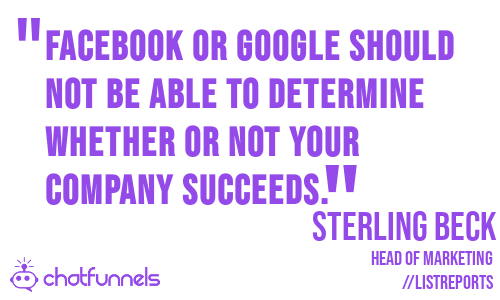
I think many of us went through that when there was that knee jerk reaction after the last presidential election and Facebook kind of got a bit overzealous in their enforcing of rules that basically said, hey, if any of your ads have anything that mentioned anything financial, political, basically they had a whole string of complicated rules that ended up leaving a lot of companies alerts were basically all their ads got pulled down for being political content, even if their ads had nothing whatsoever to do with politics.
Now Facebook eventually kind of righted that, I think, after they recognize that they were false flagging thousands and thousands of companies. But if you didn’t have a backup to that, you probably missed your quarter as a result of that. And that’s scary. Facebook, or Google should not be able to determine whether or not your company succeeds. If you’re doing your job as digital marketer, I think that you should always have a backup option in mind. And that is kind of a multi tool approach. If you want to be able to use tools that you’ve used in the past, you should also be expanding out and identifying new ways of generating great leads for your company.
Honestly, the best marketing tools are ones that you’re probably not using to impact election where everybody was kind of the gap that the idea that digital marketing has been used to persuade people politically. That kind of really baffles. It’s kind of baffling to me that people were surprised that politicians were starting to use new digital marketing tools because they message out.
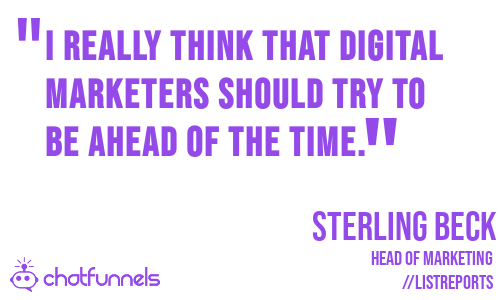
I really think that digital marketers should try to be ahead of the time. Whatever tools, and I don’t think it’s going to be Facebook comes the next presidential election. But whatever tools the Russian or whoever are using for the next election, those are probably the kinds of tools you should be familiarizing yourself with and burning. And whether that finding a way for you to push a viral loop, whether that’s using chat bots, whether that… I mean, there’s so many new tools out there, I think that allow people to achieve the same thing as what they’re achieving with Google and Facebook. I think it can be difficult to kind of motivate yourself to say okay, I’m going to figure this new tool out. I’m going to learn. I’m going to find a way to fit it into my company. What you already know is just so much easier.
Billy: Yeah. I want to dig in on one point you made. New tools, are there any tools that you’re messing around with or you’re seeing that you haven’t used yet but you think, hey, this is something most marketers aren’t using, but should be looking into?
Sterling: Yes, there’s a couple. One that I’m really, really interested in and I kind of started poking around with is the idea of email not being necessarily the best way to communicate with people and trying to find ways to maybe turn that on its head. I get so many emails every day from sales rep saying, hey, I noticed you work at a company. You should buy my product, that kind of thing. I just become dead to it. Honestly, I have hundreds of emails coming in every month. And so my email inbox is just this massive thing that I’m never going to read. I don’t have the time to say hey, bless your soul. You failed wrestling too lazy to really try to figure me out, kind of thing.
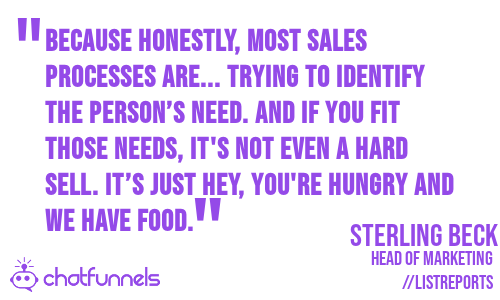
I think there’s got to be a better way of being able to rise to the top there. And I think there’s different things that you can do to maybe get people’s attention. I think honestly, that involves probably a third party. I’m really interested in the idea of emails that are coming from the third party saying hey, we’d be interested in you reviewing such and such product for us, or interested in having you participate in this survey or being able to get some feedback from you as a customer. Because honestly, most sales processes are gathering a feedback. You’re trying to identify the person’s need. And if you fit those needs, it’s not even really a hard sell. It’s just hey, you’re hungry and we have food. You should be herein essence.
Billy: That is so true. It’s all about finding the right fit. Because there’s so many products that almost any problem you’re trying to solve, there’s the usually like, hey, this is the big solution most people use but it’s not right for everybody. But if you can find that solution that’s best for you, that’s 90% of the battle.
Sterling: Absolutely. Not the pathway holiday but a year to back. I’ll never forget, I had this person who honestly I’m not sure they even own a computer. They’re not very technical, but they get some Intel. And they were going on and on, drunkenly, to me about how they were digital marketers and how they’re using the Googles to promote some concepts or something. It actually reminded me of this quote from back in the 20s when the stock market coached where this investor was asked how he knew to get out of the market. And he said, when the shoe shiner was giving me soft tips, that’s when I knew it was time to get out.
I do feel like AdWords… when you get to the point where everybody under the sun is able to fire up afterwards campaign, you’re probably not keeping your ads as a marketer by trying to swim in that very, very crowded pool, especially given that a lot of it is based around options. The more people that are bidding, the more craziness that you end up seeing. I would much rather as a marketer, like sure, I’ll participate in the office where it makes sense. But I’d much rather find a pool that no one is swimming in yet.
And better yet, if you can kind of keep that pool wall down or something that you yourself are able to take advantage of. Looking forward, I think we’ve been able to identify a couple of different aspects of just how people communicate with others. And maybe that’s unique to the real estate world. But the don’t think so. I think there’s some sort of viral networking effect. And in almost every industry that you can capture and that you can take advantage of, that’s one area where I think just understanding your customer and what they’re trying to solve for. And to your point, the people are already hungry, they’re already listening to your tool. If they’re not, you’re probably in a wrong company. I might want to rethink that.
But assuming you have a tool that actually has product market fit to the extent that people are trying to buy it, you probably do not want to spend too much time just trying to solve for, well, how do we make sure everybody knows about it. It’s much more effective to figure out, okay, what will our buyer assuming. And ideally, if it’s not AdWords or Facebook, then we have to communicate with them all the better.
Billy: Yeah, no, you’re right. Everybody is doing Facebook and AdWords. And It’s not what it was 10, 15 years ago…
Sterling: And don’t get it all wrong. There were days where I loved AdWords and there were days where I loved Facebook back in the early days in some of these industries. It was really easy. It’s no longer like shooting fish in a barrel, though, it’s gotten very expensive, it’s gotten very competitive. And it’s now gotten to the point where you have tools like SEMrush and whatnot. Your competitors can almost in real time, see what you are doing. When you update an ad, it’s not uncommon for your competitor to a day or two later had an ad and response to your ad. I always chuckle.
If you follow the mattress company, it’s notoriously like the CASPER is whatnot of the world. It’s notoriously competitive. And it’s always really fun to plug in different mattress company’s names into Google and just see all these different ads that are basically talking trash about the other ads. It’s hilarious. But it’s also, it’s great other than just like highly competitive market are probably not markets where you’re going to see great success with AdWords.
Now, if you have a really nuanced one off product that no one else is competing on, great, maybe AdWords will do it for you. But if you’re trying to build a billion-dollar company, which I imagine a lot of your listeners are trying to set out to do, at some point, you have to figure out how do we beat our competition. How do we create a unique competitive advantage? And that competitive advantage has to be in the marketing sphere. It can’t just be a product.
Billy: Yeah. For any successful company, I believe it comes down to 1, your product, and 2, your marketing. And there are most 1A and 1B. You’re right. One more question before I let you go. As a marketer, where do I prioritize my digital marketing among the other tools that I’ve got?
Sterling: I think that the many resources are too often written off as being a bad thing. Don’t get me wrong. If you’re not able to pay your workers, that’s probably a pretty bad situation. But trying to bootstrap your marketing strategy is never going to be a bad thing. I hate to admit it, but I will even sometimes accidentally launch an ad on AdWords or Facebook and suddenly find, holy cow, I spent $2,000 on an ad that had misconfigured UTM where someone else deleted the landing page or whatever.
It’s so very easy to just spend ridiculous amounts of money on those platforms and get horrible results. They’re almost optimized to allow for that. And so I would very strongly recommend looking at your product, looking at where… I tend to over use the pool analogy. But looking at where your customers are congregating, what pools are they swimming in, and trying to find some unique ways that you can get your message out to them, and maybe you use AdWords to help identify that, maybe you use Facebook to help identify that, but don’t have your primary marketing strategy be, we’re just going to spend a lot of money on Facebook.
Any agency can do that. And you’re going to be happier as a result. Even if you’re happy with them today, they’re just not going to be defensible. Over time, the results are going to get worse and worse as competition increases. And so I very much favor blend of different strategies and should always be trying new things. The best marketers out there, honestly, they don’t care how they get the results. They’re easy testing everything. And if someone says, hey, I’m getting good results out of Pinterest, try out Pinterest. And if someone’s saying, hey, I found the email template that I think that actually worked really well, give it a shot.
I am constantly amazed at the new things that are out there to discover. And I think that’s one of the things that makes marketing so much fun, is that there are always new tools coming out. There are always new methodologies. And if you want to stay in the game, you have to constantly be experimenting and constantly going outside of your comfort zone to find what work
Billy: Awesome, man. Great insight. I appreciate you taking some time. I think we’re all going to find this really useful. I’m going to come back and listen to it again. Thanks again. And then if anyone wants to get a hold of you and carry on the conversation, what’s the best way for them to get a hold of you, Sterling?
Sterling: I’m on Twitter, SterlingBeck. I’m kind of intuitively bad social media user. It’s one of those things where if you’re using it all day for work, you kind of don’t do it all that much in your personal life. But feel free to tweet at me. You can also always email me sterling@sterlingbeck.com.
Billy: Awesome, man. Well, thank you again. And until later, man, we’ll chat again.
Sterling: Alright, Bye. Thanks, Billy.
Billy: Okay, thanks Sterling.
